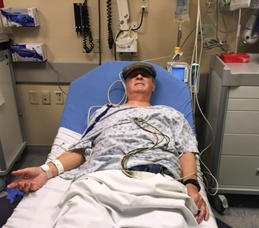 I went into the hospital “for some tests,” as we say. In the ER, I gritted my teeth against abdominal pain as I listened to the moaning and crying around me and smelled the odors of sickness. I endured. Hospitals run on their own time.
I went into the hospital “for some tests,” as we say. In the ER, I gritted my teeth against abdominal pain as I listened to the moaning and crying around me and smelled the odors of sickness. I endured. Hospitals run on their own time.
Finally a tall African-looking youth appeared in my curtained cell. Multiple ID badges clacked from his lanyard. He hooked me up to hydration and a morphine drip.
“My name is Ishmael, and I’ll be your nurse while you’re here, sir,” he said.
Despite my discomfort, I had a very strong urge to reply, “So what can I call you?” But I knew that would be silly and disrespectful, so I simply said hello.
Thinking about this exchange as I waited another hour for an EKG, I realized how different literary dialog is from real-world dialog. If we had been characters in a novel, I would have asked Ishmael the question and he would have stopped what he was doing and looked me in the face with an expression of disappointment and disdain. I think he wouldn’t have replied, not because he didn’t get the joke, but because he’d heard it a thousand times. Then he would have resumed pressing buttons on the pump controller and entering data into a computer on a stand-up workstation.
But sometime later, when the EKG was ready, he would have come back with the cardio tech and said to me,
“How you feelin’ now, Ahab?”
He would have seen me smile and that would have been my nickname for the next four hours in the hellhole and we would have been buddies forever.
The nurses in ER are a special breed. They really make an effort to keep the tone friendly and light, despite being surrounded by so much human suffering. Ishmael was expert at his job.
Why would that scene only happen in fiction? Fictional dialog, and fictional scenes in general, are never realistic, no matter how mundane they might seem on the page. We write fictional scenes to call out interesting moments of human life that are normally buried and diluted in a miasma of context.
Writing and reading are a kind of communication rare in human life. Both ends of the communication channel are almost completely conceptualized and articulated and 100% linguistically encoded and explicit.
In real life, we let most of everything go unsaid, not because we can’t think of the words, but because we are unable to conceptualize all our experience as it happens. We move through life mostly on instinct, habit, gestures, and autopilot. What we do say is often not what we mean.
But you can’t write fiction that way. You have to take every movement and understand it and find the right words to express it. The result is all very explicit, even if you are good enough to see the parts that will be understood without writing them.
And it’s the same for the reader. Everything is spelled out, even those parts that are only implied. Writing and reading constitute an unnatural kind of communication that doesn’t occur in life. And maybe that’s what makes writing and reading interesting as an art form.
Or maybe that was just the morphine talking.
